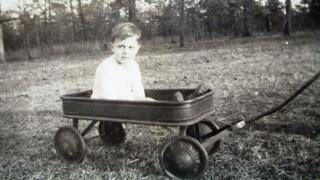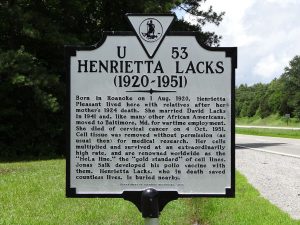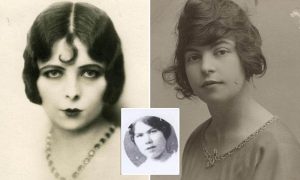Have you ever thought you were different or had people tell you you were different? Have you ever done things that seemed weird to others? As the first person diagnosed with autism, Donald Gray Triplett had these experiences. As a young child, his parents noticed he was highly intelligent, but also disconnected from the world. Donald always stayed to himself, and it seemed like he never wanted physical contact with other people. Mary and Oliver, his parents noticed that he could memorize bible verses and recite the alphabet in reverse order, but he always wanted to be alone. Donald’s rising behavior issues and his parents bewilderment on how to handle him led them to seek medical help.1
In August 1937, Donald’s doctor classified him as an overly stimulated child and suggested a change of environment would be helpful. At the age of three, Donald was institutionalized. Upon arrival, Donald was separated from his parents to live in a facility that was “not made for children like him in mind.”2 As a confused child, he did not know what was going on. All he knew was that he was taken from his home and being placed somewhere strange. Donald’s time in the facility weighed heavily on him, and he faded away physically. While waiting for Donald’s return, his parents did not receive any news of his condition improving; instead, he got worse and stayed confined to himself even more. As they gave up hope, his mother described him as a “hopelessly insane child.”3

Tired of waiting for Donald to miraculously get better, in August of 1938, his parents took him home. However, instead finding comfort, their sadness was only magnified by his behavior. Every day, all Donald wanted to do was spin his toys and watch with fascination the different musical notes, numbers, and pictures of the states. To Donald, this type of play was the only thing that mattered; his parents were just another part of the scenery. His father stated that he appeared to be oblivious to everything around him, like he was living in his own little world. It did not show any affection for his parents. Life for Donald and his parents was hard and it continued to get harder each day. His parents were at a loss and didn’t know what to do. Things got worse as Donald started throwing intense temper tantrums if his daily routine was disturbed. He became unresponsive, and if someone called his name or asked him a question, he would not answer or give one word answers. A highly intelligent boy, Donald had a lot of issues in expressing himself.4
In October 1938, frustrated with the digression of Donald’s behavior, his dad asked Dr. Kanner, a psychiatrist at John Hopkins Hospital, for help.5 Donald’s dad wrote the doctor a thirty-three page letter describing in detail every action and emotion Donald displayed.6 Dr. Kanner met Donald for the first time in Baltimore in 1938. He noticed that Donald did not acknowledge him but moved straight to the toys. This led him to try something different, something that might finally get Donald to react with some emotion. Dr. Kanner poked Donald with a pin to evaluate whether Donald showed any reaction toward the pain. Donald’s reaction was telling. Dr. Kanner could see that Donald did not like the pain, but he did not care any more or less for the doctor, because he was indifferent to what was going on. Dr. Kanner believed Donald could not attach the pain to the person who inflicted it. Throughout his visit with the doctor, Donald was indifferent to the doctor’s presence as if he was just furniture in the room. After two weeks, Dr. Kanner eliminated schizophrenia, a disorder he originally suspected Donald had. Finally, four years later, he wrote to Donald’s mother to inform her that Donald had autistic disturbance of affective contact.7 Nobody could to change the fact that Donald had this disorder. His autism led Donald to experience anxiety and sensitivity to sound, as well as to have learning disabilities. His actions and words were repetitive, and he had trouble understanding people’s emotions. The only option for Donald was to take it a day at a time as he found support through life’s challenges that came with this diagnosis.

Today, Donald leads a normal life coping with his autism. He lives alone in his childhood home. He still has issues socializing, but he came out of his shell to drive and golf. And, in 1957, he even pledged a fraternity, Lambda Chi Alpha, which surprised lots of people. Donald has traveled to 36 countries and 28 U.S states.8 Donald proved he would not let his autistic disorder keep him from living life. People with autism still face stigmas today. Donald stands as a hero, he faced numerous obstacles. Even while coping with autism, he was able to still live his life. Have you ever thought you were different or had people tell you, you were different? Have you ever done things that seemed weird to others? Everyone faces these questions in their life, and at some point, everyone can say that they have felt different before. Donald illustrates how to not let your difference define you. Any life is worth living no matter the difference and disorder.
- Kimberly Maich and Carmen L. Hall, Autism Spectrum Disorder in the Ontario Context: An Introduction (Toronto: Canadian Scholars Press, 2016). ↵
- John Donvan and Caren Zucker, “Autism’s First Child,” Atlantic 306, no. 3 (October 2010): 81-82. ↵
- John Donvan and Caren Zucker, “Autism’s First Child,” Atlantic 306, no. 3 (October 2010): 82. ↵
- Christine D. Shoop, “Examining Maternal Psychological Recollections of Children Diagnosed With Autism Spectrum Disorders,” PhD diss., Walden University, 2016, ↵
- Britannica Biographies Encyclopedia, 2012, s.v. “Triplett, Donald Gray,” by Richard Pallardy. ↵
- John Donvan and Caren Zucker, “Autism’s First Child,” Atlantic 306, no. 3 (October 2010): 85. ↵
- John Donvan and Caren Zucker, “Autism’s First Child,” Atlantic 306, no. 3 (October 2010): 85. ↵
- John Donvan and Caren Zucker, “Autism’s First Child,” Atlantic 306, no. 3 (October 2010): 88-89. ↵



49 comments
Bianca-Rhae Jacquez
I think it was wild doctors hadn’t diagnosed anyone with autism until 1937. I also think that it’s horrible that this young boy had to be institutionalized basically because his doctor didn’t know what was really wrong with him. Medicine has come a long way and that’s extremely wonderful. I loved this article especially since I had never heard of this story.
Felicia Stewart
This was a very interesting read. As someone in the psychology field this article sparked interest to me because of it being on Autism. Autism is one of the most widely known psychological disorders that is out there. It is even said that nearly everyone lies somewhere on the Autism Spectrum range, however, I am not entirely sure how true that is. I am sure if was very tough for him and his family, especially being the first to have such a disorder during a not so accepting time period, it is even hard to live with it now.
Samantha Ruvalcaba
Putting a date late 1937 as the first diagnosis of autism seems strange. Because of how common autism and learning deficiencies are now, one would think that they dated even earlier than 1937. It’s also unbelievable how it took Dr. Kanner four years to diagnosed Donald. I’m glad that nowadays our medical technology is so advanced that one could be diagnosed in such for amounts of time. I’m also glad Donald is doing better now.
Fatima Navarro
Donald Gray is an inspiration. I am glad he was able to live his normal life, as much as he can, even though odd were against him with his parents fearing him, and the doctors not really knowing what was going on until he was finally diagnosed and started getting treated. Just thinking about how it is still a stigma in today’s society, I can’t began to imagine how difficult it was back then.
Christopher Metta Bexar
As someone interested in special education and having read about other people with autism disorders it was really interesting hearing about Donald Triplett.
Autism has nothing to do with intelligence or what form it takes ( as anyone who has read books by Dr. Temple Grandin will attest).
As the article so correctly states it turns out the primary clues in diagnosing it seem to be the repetitive nature of actions and stimuli sought as well as the appearance of living in their own world.
Donald is lucky he has linked into the ‘so called’ normal world. Many don’t make it.
Eric Ortega Rodriguez
Let me start off by saying that Donald can be looked at as an inspiration. He was the first person to be discovered but there is more to it than just that. I found it sad that he had so much mental capability but just wanted to be left alone. As this article states, it was extremely difficult for him to show emotions, however, he was able to do drive and play golf. Overall, this was an original topic and was very well written. Good work.
Maya Mani
Back then, any sort of disability- whether that was physical, developmental, or mental, were hard to diagnose. Thankfully there’s so much more we know today about these kind of disorders, and we’re a lot more accepting. I’m glad to see Donald is effectively coping with Autism and is not allowing it to press limitations on his life. It seems like his parents were really supportive though, and the doctor was also very patient. Thankfully his diagnosis not only helped Donald but millions of other people.
Montserrat Moreno Ramirez
It must have been really tough for Donald’s parents to not know what was going on with his kid, wanting the best for him led him to put him away and maybe it wasn’t the smartest solution. I can only imagine what it must be to be Donald, always thinking, always following a routine and how sad it must be not being able to share what you feel or ain’t able to express it correctly.
Interesting!
Lyzette Flores
It must have been really tough for Donald and his parents to face through all of this. All his parents wanted to do was help their son out but had no idea how to. Since nobody knew what autism was back then, I bet they took it by surprise once he was diagnosed. I am glad at the end they were able to figure out what was going on with Donald and were able to get some relief off their back and focus on meeting his needs.
Antoinette Johnson
Donald Triplett was able to live a prosperous life with Autism. Autism has many stigmas that surrounds it. These stigmas can affect the individuals with Autism by making them feel inferior. But Autism is just a disorder that they have, they are people who have wants and needs. Donald had a lot of trouble expressing himself and even though he loved his parents; he did know how to show any emotion. He did his best and he is living his life to the fullest.